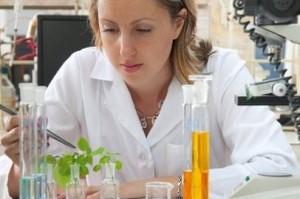Agricultural and Food Scientist: Education and Career Information
If you are interested in plants and food production, establishing a career path as an agricultural and food scientist may be the right choice for you. This is a highly specialized position that require a vast knowledge of biology and engineering to be successful.
What does an agricultural and food scientist do?
Agricultural and food scientists conduct research and other experiments to improve the quantity and quality of field crops and farm animals. They also create new food products through developing new and better ways to process, package and deliver them. They also study plant growth, soil and their composition, working with the scientific community and the public. This person travels to different facilities for new projects. You can find them working in government agencies, at food processing plants, outdoors on farms, in a lab, in wildlife areas and other entities where food production is a major factor. An agricultural and food scientist works within all areas of food production, working and studying to improve the processes and breeding for livestock, as well as improving the yield and quality of agricultural output. A food scientist and agriculture technician also assists with the breeding of animals and how to prevent and cure illnesses within livestock. These individuals work on quality control methods, how to package food properly, and the development of technology used to produce and transport the food eaten by the general public to make sure the food is safe for consumption.
How much does an agricultural and food scientist earn?
An agricultural and food scientists earns about $28 per hour, or $58,610 per year. The salary is based on education, experience and a host of other factors. The employment outlook for agricultural and food scientists should grow about nine percent and the job market is growing through 2022.
What skills does an agriculture and food scientist need?
There are a number of things that are needed to be successful as an agriculture and food scientist:
Ability to communicate clearly: The agriculture and food scientist should be able to communicate with the public and decision-makers on research and other food products to make sure everyone is on the same page, having everyone work cooperatively.
Research, teaching and writing skills: This is essential for this position. An agricultural and food scientist works to assess how food is grown, how it works, how farmers can adapt and make things better and make viable solutions. It is important to be able to document all the findings clearly, and teach others on a number of different food items.
Attention to detail: It is important to have all the little details in order. Since this is a research-based position, being able to effectively understand and outline things that would be beneficial to others is key.
Science and math: In every position that is related to research and growth, a strong background in math and science is essential. It is important to know what types of formulas that need to be utilized. A combined in-depth knowledge and scientific background makes a huge difference.
Assessment: Being able to assess a problem and come up with a solution is a key component of being an agriculture and food scientist.
Working with others: Being able to work with others is essential, especially when having to work with others and give them the information they need. Being personable is always a good way to establish relationships with others and make a difference.
Working independently: This position has a high degree of work that will be done independently. It is important to be able to have autonomy and ownership of the work to be effective in this capacity.
Technology oriented: Technology plays a big role in food science, and knowing how to use certain programs and being proficient with the computer is necessary.
Internship requirements
This program is research based, which involves a huge internship component. The internship hours required for completion of the program will vary based on the program and the needs of the students, their specialization and a host of other factors that will enhance their learning.
Education requirements
There are a number of education requirements to becoming an agriculture and food specialist. First, you should pursue a bachelor’s degree in food science. These courses in the program will include food chemistry, food microbiology, quality assurance of food, chemical methods of food, analysis, and physical methods of food analysis. There are advanced degrees available in the food science track that will assist in excelling in this field. While there are a number of food service programs, being in an accredited program is important to gain the right foundational tools for success.
The Master’s and doctoral programs are advanced and specialized programs that have a number of classroom and laboratory instruction for hands-on training. Students learn the principles of food engineering and advanced food microbiology. Chemistry, food safety, research and preservation are also major emphasis programs. The doctoral programs are focused on getting students ready to become teachers in this field.
There are certification programs that will allow food scientists to gain credibility in the field. These certifications are administered by a number of different organizations based on area of concentration.
If you are interested in pursuing a career in this field, you will join a number of people who are interested in the way food is being grown, prepared and how it affects the environment. This could be a very interesting and meaningful position for the right person who cares about how food affects humans and the reproductive system. If this interests you, this would be a good career path to follow.






